11 Days Northern Circuit Highlights
Total Cost: $7,590 Per Person Sharing (2pax) Home > Safaris Overview This 11-day Tanzania safari offers an unforgettable journey through the country’s most iconic national parks and diverse landscapes. Begin your adventure in Tarangire National Park, famous for its majestic baobab trees and large elephant herds, before heading to the endless plains of the Serengeti, where you’ll spend several days exploring its rich ecosystems of grasslands, acacias, volcanic soils, and rocky kopjes teeming with wildlife. Continue to the breathtaking Ngorongoro Crater, a natural wonder filled with an incredible concentration of animals against a backdrop of lakes, forests, and grasslands. The journey then takes you to the beautiful Lake Manyara National Park, known for its tree-climbing lions and flamingo-dotted shores, and finally to Arusha National Park, a scenic gem with diverse habitats and views of Mount Meru. The safari concludes in Arusha, leaving you with lasting memories of Tanzania’s extraordinary beauty and wildlife. Day by Day Itinerary Day 1: Tarangire National ParkYour adventure begins with a drive from Arusha to Tarangire National Park, a scenic reserve known for its vast landscapes dotted with ancient baobab trees and large elephant herds. Enjoy an afternoon game drive along the Tarangire River, where you may spot zebras, giraffes, wildebeests, and various bird species drawn to the water. As the sun sets, settle into your lodge or tented camp surrounded by the tranquil sounds of the wilderness. Overnight in Tarangire. Day 2–6: Serengeti National ParkAfter breakfast, journey north to the legendary Serengeti National Park, one of Africa’s most celebrated wildlife destinations. Over the next five days, explore the park’s sweeping plains, acacia-dotted landscapes, volcanic soils, and rocky kopjes that serve as lookout points for lions and leopards. Enjoy daily game drives across different regions of the Serengeti, encountering wildebeests, zebras, elephants, giraffes, and an incredible variety of predators and birdlife. Each day offers new experiences, from sunrise safaris to sunset views over the endless savannas. Relax each evening at your lodge or tented camp within the park. Overnight in Serengeti. Day 7: Serengeti to Ngorongoro Crater RimAfter a final morning game drive in the Serengeti, depart for the Ngorongoro Conservation Area. Along the way, you may visit Olduvai Gorge, an important archaeological site known as the “Cradle of Mankind.” Continue to the crater’s edge, where your lodge offers panoramic views of the world’s largest intact volcanic caldera. Overnight at the Ngorongoro rim. Day 8: Ngorongoro CraterToday, descend into the Ngorongoro Crater, a UNESCO World Heritage Site often called Africa’s “Eden” for its incredible density of wildlife. The crater floor is a mosaic of lakes, forests, and grasslands, home to lions, elephants, zebras, hippos, flamingos, and the rare black rhino. Enjoy a full-day game drive with a picnic lunch beside one of the crater’s scenic spots before ascending back to the rim in the evening. Overnight near Ngorongoro. Day 9: Lake Manyara National ParkAfter breakfast, travel to Lake Manyara National Park, nestled at the base of the Great Rift Valley escarpment. Known for its lush forests, pink flamingos, and famous tree-climbing lions, the park offers a refreshing change of scenery. Explore the diverse habitats on your game drive, spotting elephants, giraffes, baboons, and abundant birdlife. Overnight in the Lake Manyara area. Day 10: Arusha National ParkToday you’ll visit Arusha National Park, a small but stunning reserve rich in variety. Its landscapes include the forested slopes of Mount Meru, sparkling crater lakes, and open grasslands. Spot colobus monkeys, buffaloes, giraffes, and waterbirds, and enjoy the serene atmosphere of this less-visited gem. Overnight in or near Arusha National Park. Day 11: Return to ArushaAfter breakfast, enjoy a leisurely drive back to Arusha, where your safari comes to an end. Reflect on the incredible wildlife encounters, breathtaking landscapes, and unforgettable moments that defined your journey through Tanzania’s most iconic parks. Prices per person (2 pax) Camping: $7,590 Mid-range: $9,790 Luxury: $11,990 Inclusion and Exclusion Park fees All activities (unless labeled as optional) All accommodation (full board) as stated in the itinerary All ground transportation and gas as per itinerary days (4×4 Land Cruiser with a pop-up roof for game viewing) A professional driver/guide All Taxes/VAT Mineral water All Meals (as specified in the day-by-day section) International flights (from/to home) Additional accommodation before and at the end of the tour Tips (tipping guideline US$10.00 pp per day) Personal items (souvenirs, travel insurance, visa fees, etc.) Alcohol drinks Services not mentioned in the program Travel insurance and medical repatriation Items of a personal nature
Trailblazer Maggie Duncan Simbeye, Tanzania’s First Indigenous Woman Safari Owner
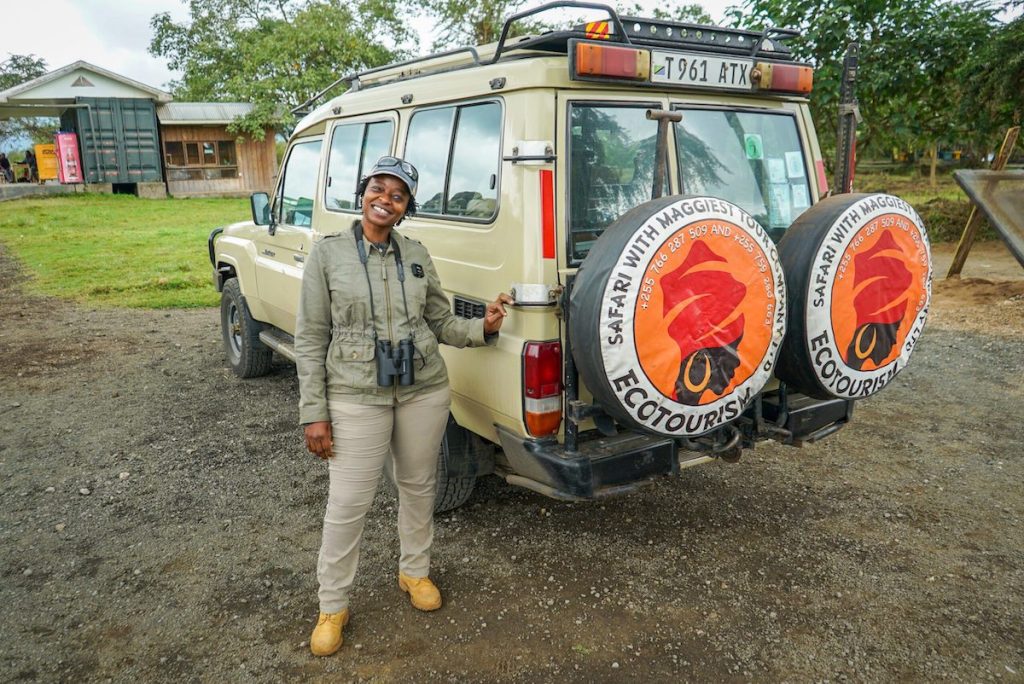
Home > Blog Empowering women to become safari driver guides: by Rupi Mangat In Tanzania, Maggie Duncan Simbeye is a trailblazer, opening doors for other women to dare big. As one of the first Indigenous woman safari drivers and guides and owner of her own safari company – Maggie’s Tour Company, her story is nothing short of inspiring. Growing up in a rural on the slopes of Mount Kilimanjaro, Africa’s tallest mountain, her prospects like those of so many other young women, were limited to getting married and having children. She did get married which turned sour. Left alone to fend for herself and her children, here’s her story. Tourism offered a new path Born in 1975, Maggie grew up in a rural village in Tanzania near Moshi on the foothills of Mt. Kilimanjaro in a very controlling patriarchal community. It was a tough life with abusive lifestyles from schools to most homes. This was not the life Maggie wanted. Focused on being independent and not following in the footsteps of her mother and the local rural women, she ventured into tourism “to empower myself and other women who are slaves in a patriarchal society like I was,” she says. Most rural women stay home to clean dishes, cook for the men and the family, wash, take care of the cows, fetch water from the river, and collect firewood rain or shine. Venturing into the safari business After high school, encouraged by her mother and grandmother, Maggie enrolled at the Vocational Educational and Training School (VETA) to study catering. It was tough because there was little money for herself and her four siblings. After graduating, Maggie was employed by the government (VETA HIMO) to teach at the college after which she secured a job at the prestigious Ngurdoto Hotel where she served dignitaries like Kofi Annan (the seventh secretary-general of the United Nations from 1997 to 2006 and co-recipient of the 2001 Nobel Peace Prize) and the former President Kikwete (the third president of Tanzania). It was here that Maggie started dreaming of owning her own safari company. She enrolled herself at a tour guiding college in Arusha (Professional Tour Guiding School, PROTS) despite not having enough money for the fee. “The administrators allowed me to pay half and finish payments after I got a job because I had enrolled my siblings there and so they trusted me.” The challenge was to raise the required funds with a job that allowed her to attend college during the week and work weekends. And a job she did find – as the first female bouncer at Colobus Club, a nightclub in Arusha whose owner she had met at Ngurdoto Hotel. Read More
Maggie Breaks into Tanzania’s Male-Dominated World of Wildlife Tourism
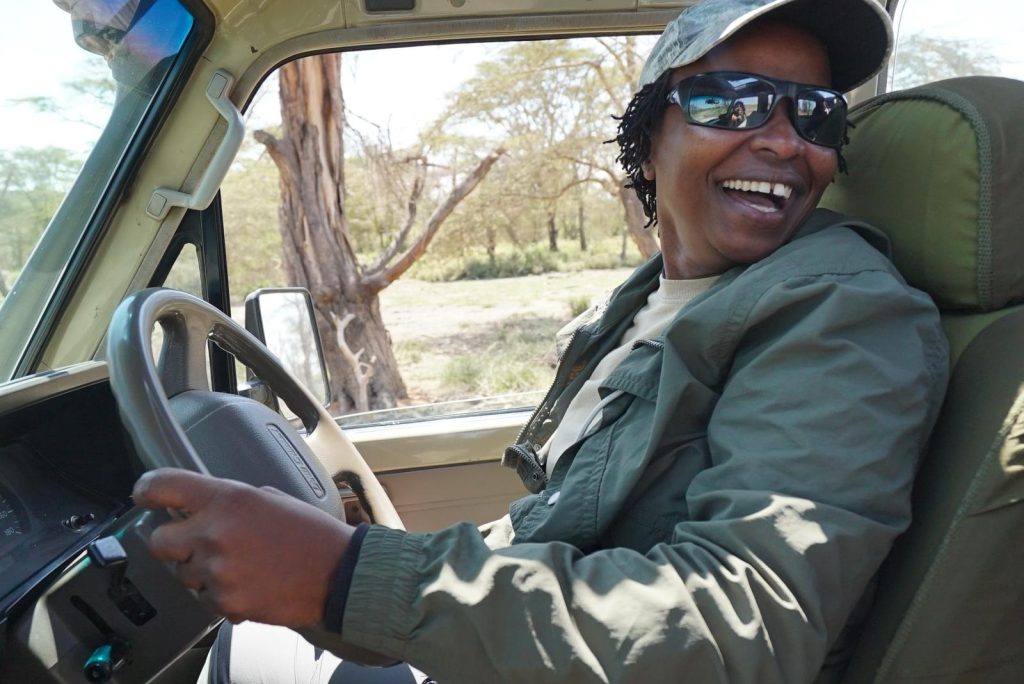
Home > Blog Maggie Breaks into Tanzania’s Male-Dominated World of Wildlife Tourism Abstract Maggie’s Tour Company Limited is a small enterprise located in Arusha (Tanzania) owned and managed by Maggie Duncan Simbeye, the first Tanzanian woman to own and operate her own tour company. She manages her business with a masterful hand, driven by a strong belief in the importance of respecting and protecting the environment, offering ‘responsible travel to natural areas that conserves the environment and improves the well-being of local people’. Information For Skema: Written on the basis of material provided by Maggie Simbeye of Maggie’s Tour Company.© CAB International 2021 Exploring the case – notes for teachers and students This case has accompanying exploring notes to enable further understanding of the case study, during classroom discussion or as enhanced individual learning. Learn More…
Tanzanian visitor – University of Delaware
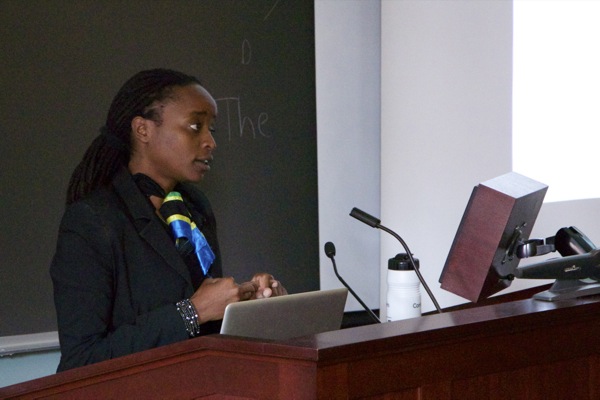
Home > Blog Foundation founder shares her experiences in community education 6:22 p.m., April 25, 2014–Tanzania is a country known for its mining, agriculture, vast game reserves and tourism. What may be less known is that women in Tanzania face many challenges regarding education and health. One woman committed to addressing these challenges visited the University of Delaware this week to share her message with students, faculty, staff and friends. Maggie Duncan Simbeye is the founder of Dare Women’s Foundation (DWF), an NGO focused on education for women and children regarding feminine hygiene, wildlife conservation, and nutrition. During her UD visit, Simbeye lectured in women’s studies, leadership and sociology classes. She also co-presented at a talk with Jon Cox, assistant professor of art, on the book he co-authored, Hadzabe, By the Light of a Million Fires. In addition, Simbeye spent an afternoon at Longwood Gardens to meet with the continuing education department, attended a brown bag lunch discussion at the Institute for Global Studies (IGS), went early morning birding at Bombay Hook National Wildlife Refuge in Delaware and reunited with the study abroad students she met this winter. One of only five female guides in Tanzania, Simbeye began a relationship with UD five years ago when she served as guide for a study abroad program led by Cox and Jacob Bowman, chairperson of the Department of Entomology and Wildlife Ecology. “She is an amazing connection within the community. Without her we would just drive by and wave,” said Cox, explaining that Simbeye helped students meet the locals and experience the culture. Her work as a guide and leader in community education inspired UD students Lindsay Yeager, Claire Lieber and Rebecca La Placa to create a short film about DWF while studying abroad. Their film won second place in the DENIN Environmental Film Festival held on campus this winter. Yeager, who is the director of visual art for DWF, accompanied Simbeye to many UD events during her visit. This year, Yeager received a $250 fellowship from the Office of Service Learning (OSL) to fund her work with Simbeye, including printing business cards and brochures. “[Prof. Cox and Dr. Bowman] are both amazing and none of this could have happened without them teaching me the importance of giving back,” Yeager said. Thoughts Into action At a young age, Simbeye said she knew she could be an agent of change, especially for her family. Coming from a middle-class family with six children, she sensed that her parents would struggle to send them to school. Her instinct told her that she could do more to help and provide opportunities for her siblings. “I thought, it’s time for me to help and find a solution,” Simbeye said. She chose to enroll in cooking classes for pragmatic reasons — the classes were short and would enable her to make connections in the tourist industry where she hoped to find work. Simbeye’s plan succeeded, and with her earnings, she was able to pay for her siblings’ college tuition. While attending school, Simbeye had an epiphany that led her to create DWF. The lengthy walk to and from school, often carrying water and firewood, was a challenge for Simbeye, as it was for most students. Adding to that was the monthly arrival of her menstrual cycle, for which Simbeye had only a cloth as protection. The lack of proper hygienic products made her feel uncomfortable, polarized and distracted. Noting that a high percentage of young girls in Tanzania abandon school once they reach puberty, Simbeye realized that a lack of awareness about proper feminine hygiene might be the major reason why. She immersed herself in local communities throughout Tanzania and found that her hypothesis was true. Once she understood the problem, Simbeye acknowledged that she needed to provide an answer. “I said to myself, I have to handle this, if I run who will take care of this?” Simbeye and her organization now focus on providing feminine hygiene education and products to Tanzanian women to improve their quality of life and keep them in the classroom. Women who complete their studies are better able to attain careers and contribute to the local economy. Hospitality careers are available in the country due to the extraordinary landscape and wildlife that draw tourists. Tanzanian education is largely focused on the environment, and by helping women stay in school they gain the tools to become environmental leaders in their country. DWF educates women and children, including orphans, about the national parks, natural resources and how to respect and conserve wildlife. The third educational component to DWF is nutrition. A large portion of the Tanzanian diet includes carbohydrates such as potatoes, rice and corn. The foundation works to provide education about incorporating fresh fruits and vegetables into meals, supporting a healthier lifestyle. Outreach IGS and OSL are dedicated to providing students with opportunities to learn and grow through international education and addressing needs of communities through service. At the Institute for Global Studies, Colin Miller, a limited term researcher, is focusing on building collaborative relationships and strengthening connections in his native South Africa. Citing the importance of UD’s involvement in such organizations as DWF, Miller said, “External partners can play a significant role in bringing local partners together.” To learn more about the Dare Women’s Foundation, visit its website. The Institute for Global Studies was created in 2009 to enhance the international dimensions of teaching, research and outreach at the University of Delaware. IGS provides leadership and support for programs and experiences that contribute to the education of informed, skilled, open-minded citizens of the world. Best known for coordinating the University’s study abroad program, IGS also awards scholarships and grants to faculty and students for global travel and research, administers internationally-recognized programs such as the MEPI (Middle East Partnership Initiative) Student Leaders Institute, and sponsors such signature events as International Education Week each fall and country-specific celebrations each spring. IGS also partners with other global partners on campus, including the Office for International Students and Scholars, the Confucius Institute
Meet Maggie
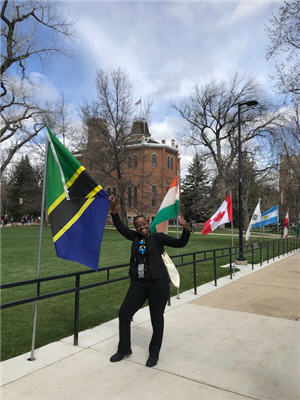
CEOs Adventure Home > CEOs Adventure Maggie Duncan Simbeye Founder & Managing Director Maggie Duncan Simbeye first began working for a local safari company in 2008 where her “classroom” training moved from Tourism Training School to hands-on experiences in the bush. She was one of the very first women guides in Tanzania. As of 2018, Maggie is the only Tanzanian woman owning and operating her own Tour Company. Tanzanian women in business are very unusual in her country. Her own love of learning and experiencing nature on all levels motivates her to make every safari trip special for her clients! She has a belief that we all learn from each other, so she invites all questions and asks plenty herself! Her extensive knowledge of flora and fauna is delivered with much enthusiasm. She has an incredible understanding of animals and their behaviors which adds so much when clients observe them in their natural surroundings. Nishaeli Frank Kileo Co Director Nishaeli Frank Kileo works as a Doctor and first-aider attender but is also an expert in guiding and leading family groups as he is an Occupational Therapist. Kids love him!He also has good and long relationships with different tribes. He is also Maggie’s husband, and sometimes they lead couple safaris or honeymooners’ safaris and adventures! He does Conservation projects like battery recycling! Come learn more from him. Her personal commitment to help others in the communities she encountered working as a guide, plus growing up in Tanzania, energized her to create the Dare Women’s Foundation in 2013, something she had been working toward since 2005. The Dare Women’s Foundation is a local NGO working to empower Tanzanian women and girls, with a focus on rural areas, through poverty alleviation, economic empowerment and gender equality. Maggie and the volunteers she manages are currently working on several projects related to conservation education, creating reusable sanitary pads, entrepreneurship, micro-loans, nutrition education and education advocacy for all children. In Maggie’s own words “ I believe in four pillars of life: Gratitude, Love, Abundance and Compassion. I know that each and every one of us can make a difference in someone’s life if we reach out to others from these first three and extend compassion to everyone we meet. One person can make a difference! I have experienced this and take action to make a difference where I can.” In Maggie’s own words “ I believe in four pillars of life: Gratitude, Love, Abundance and Compassion. I know that each and every one of us can make a difference in someone’s life if we reach out to others from these first three and extend compassion to everyone we meet. One person can make a difference! I have experienced this and take action to make a difference where I can.” Her commitment to making a difference, along with the college students and professors she has worked with as a tour guide, paved the way for her to receive an invitation to speak at the 66th Conference on World Affairs in Boulder, Colorado in 2013 which was sponsored by the University of Colorado. She was nominated and chosen again to speak in 2018 at this same international conference. Maggie also empowers young women by mentoring them to be tour guides, giving her time and support as they learn to become wage earners for their families. Maggie never tires of exploring the landscape of her country, sharing details and stories of the natural surroundings. She may even invite you to a moment of silent reflection to take in the wonder of it all! African Women Stories and Tour Company Limited is a dream realized by this amazing woman! Plus she is a whole lot of fun! Plan Your Safari
Seed for Change
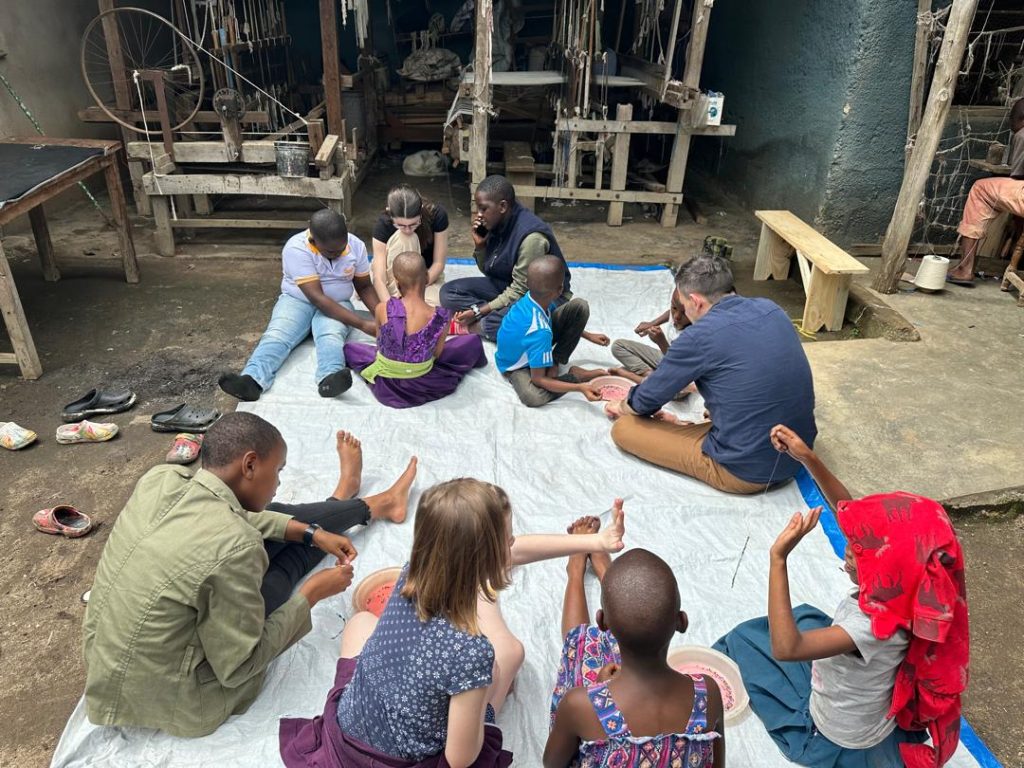
Transform Family time into a Life-Changing Adventure Home > Blog Seeds of Change is a Unique Family Experience of Volunteering, Adventure, and Fun. Welcome to Seeds of Change, a unique family experience blending volunteering, adventure, and unforgettable memories in Tanzania. This program is crafted to bring families closer through meaningful experiences, allowing parents and children alike to dive into a world of exploration and service. With Seeds of Change, families not only experience the thrill of a safari but also gain a deeper understanding of Tanzanian communities, culture, and wildlife conservation efforts. A Journey with Purpose Seeds of Change takes family vacations to a new level, combining the excitement of Tanzania’s renowned safari adventures with impactful volunteer opportunities. Imagine sharing the thrill of spotting a lion in the Serengeti one day and helping local communities the next, giving your children the chance to learn, engage, and contribute. Each Seed of Change journey is designed to instil a love for adventure while fostering empathy and awareness of global diversity. Adventure Awaits: Safari Experience Every family adventure begins with a tailored safari, where you’ll witness Africa’s iconic wildlife in their natural habitats. Traverse the savannas of the Serengeti, explore the Ngorongoro Crater, and marvel at the incredible biodiversity of Tarangire and Lake Manyara. Experienced guides will lead your family on a journey through these breathtaking landscapes, creating moments of wonder and discovery for both young and old. Hands-On Volunteering Opportunities Our volunteer programs offer an opportunity to connect respectfully and engagingly with Tanzanian communities. Working alongside local leaders, families can participate in activities that range from supporting educational initiatives in schools to helping with sustainable farming practices and conservation projects. Children and parents alike will have the chance to make a lasting impact while learning about the resilience, traditions, and warmth of Tanzanian culture. Why Choose Seeds of Change? Family-Centered Design: Activities and accommodations are chosen with the whole family in mind, ensuring a safe, enriching experience for everyone. Hands-On Learning: Children and adults engage in authentic cultural exchanges, inspiring a love for learning and compassion for global communities. Tailored Itineraries: We customize your journey to ensure that both adventure and volunteering are age-appropriate and engaging for each family member. Lasting Impact: Seeds of Change is committed to supporting the local economy, sustainable tourism, and community development projects that empower Tanzanians. Make a Difference Together Join us in creating memories that matter. With Seeds of Change, family time transforms into a journey of growth, connection, and purpose, with experiences that will inspire your children and leave an indelible mark on your hearts. As a family, become a part of Tanzania’s story and share in the joy of making a difference. Join The Community
Fundraiser Documentary Screening: Hidden in Plain Sight by Rachel Levy
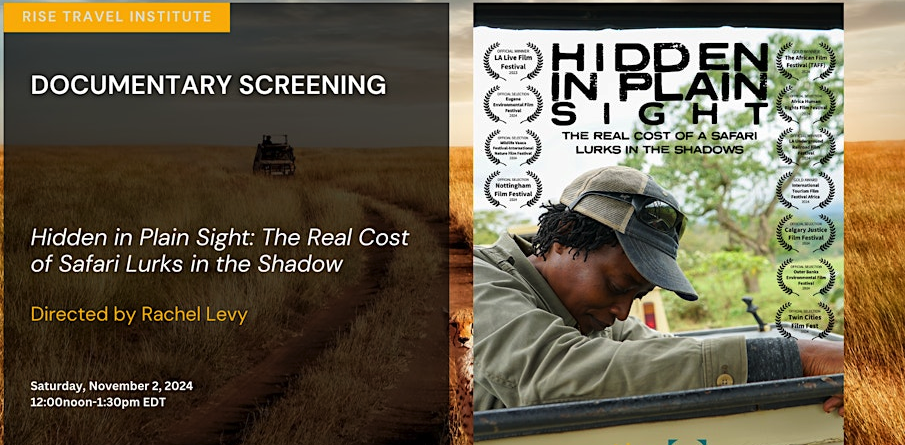
Fundraiser Documentary Screening: Hidden in Plain Sight by Rachel Levy Home > Documentary Fundraiser Documentary Screening: Hidden in Plain Sight by Rachel Levy Join us for a screening of “Hidden in Plain Sight,” a powerful documentary that sheds light on the hidden realities of Tanzanian safari. https://www.youtube.com/watch?v=toL9PT57IVo&ab_channel=221BProductions About the Event RISE Travel Institute is thrilled to announce a special screening of “Hidden in Plain Sight: The Real Cost of a Safari Lurks in the Shadows,” a mini-documentary that explores the dark side of the safari industry. Filmmaker Rachel Levy’s award-winning film uncovers the pervasive economic leakage and exploitation perpetuated by foreign-owned companies across Tanzania. Through interviews with local guides, safari operators, and community leaders, Levy shines a light on the rarely discussed aspects of the safari industry. For the first time, this film shares a side of the industry that has been silenced for years by heavy-handed, foreign-owned companies. As one speaker in the film says, “Anything outsiders know about Tanzania was probably told to them, shown to them, or explained to them by someone that hasn’t spent more than a month in our country. Now it’s our time to tell our own story.” Date and timeSaturday, November 2 · 7 – 8:30pm EATLocation: Online Read More
